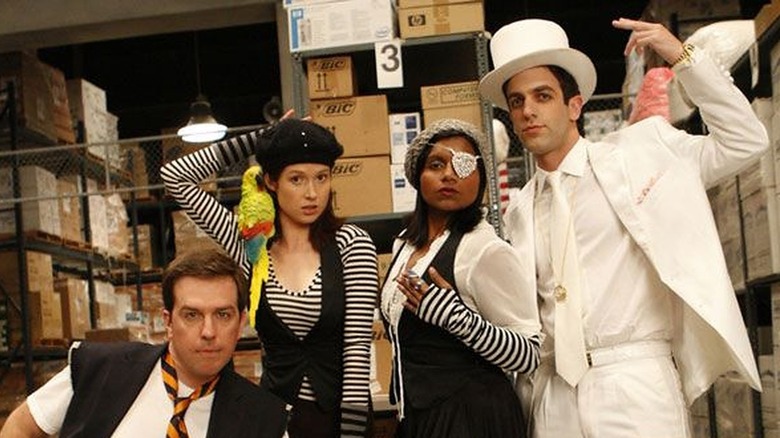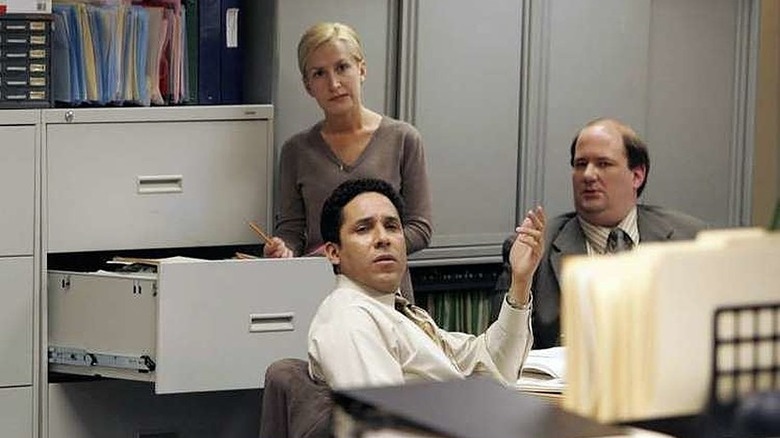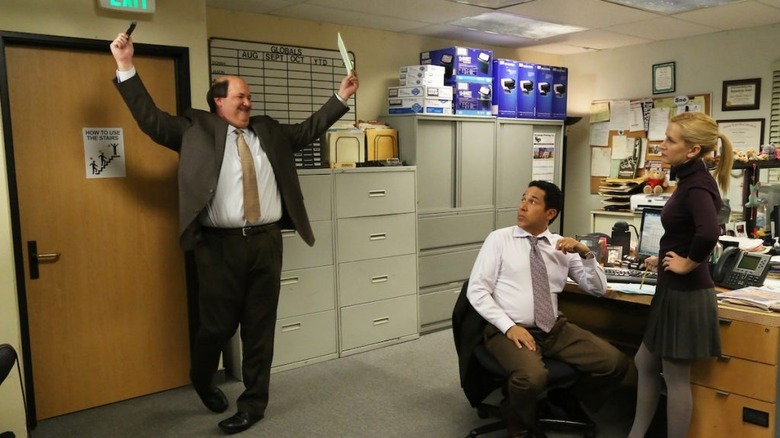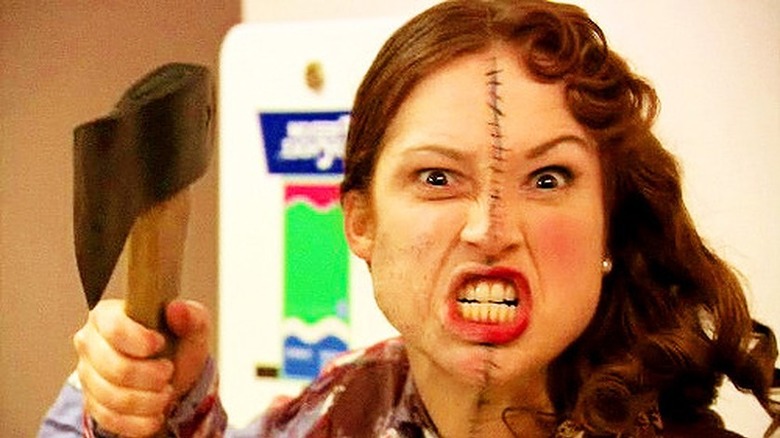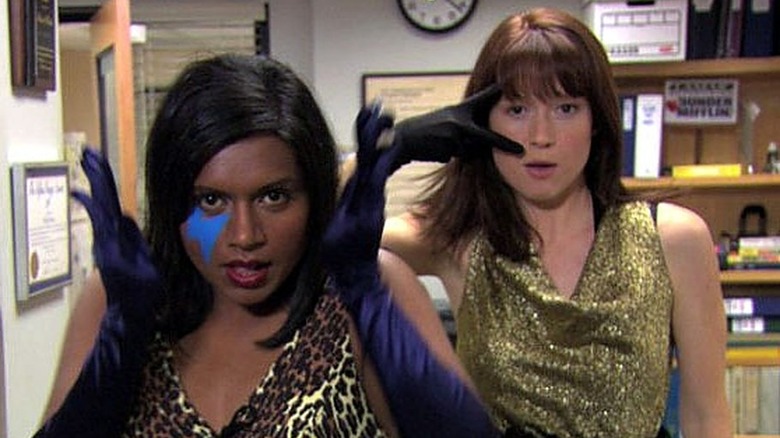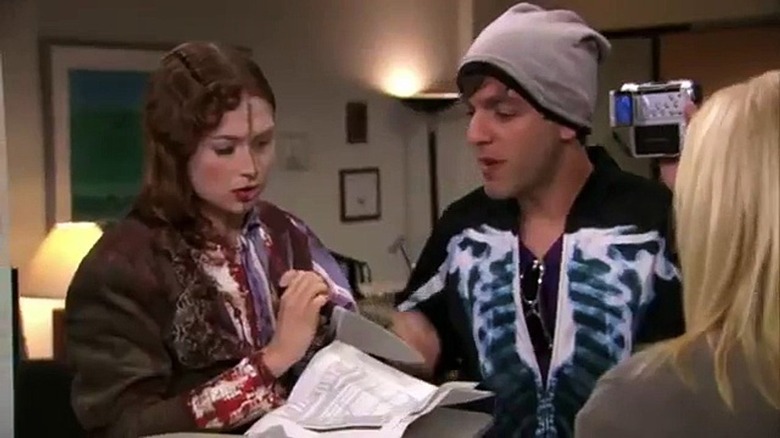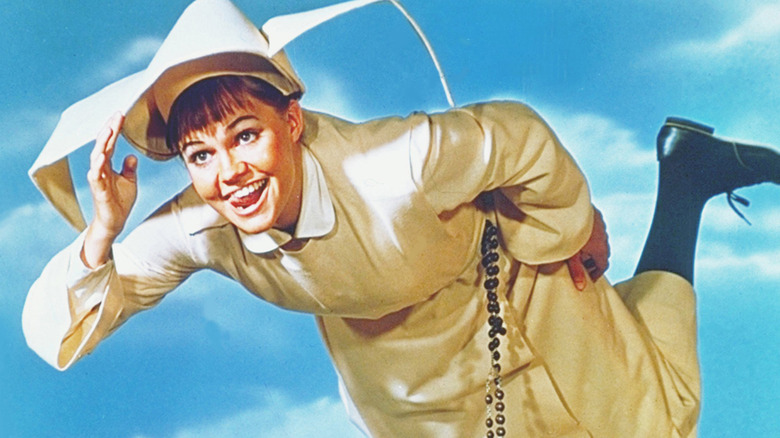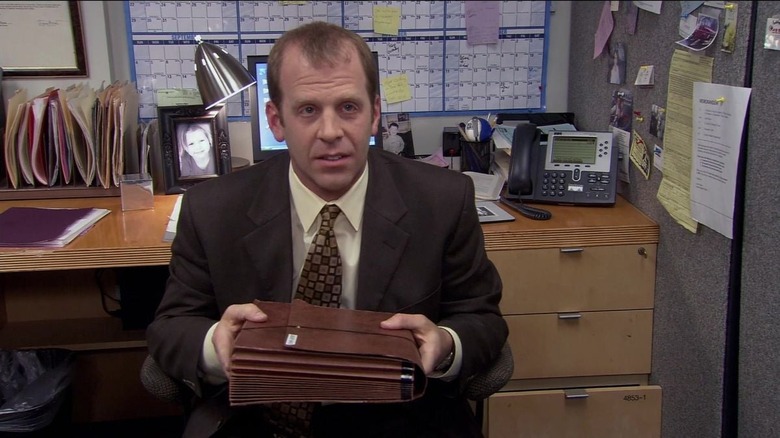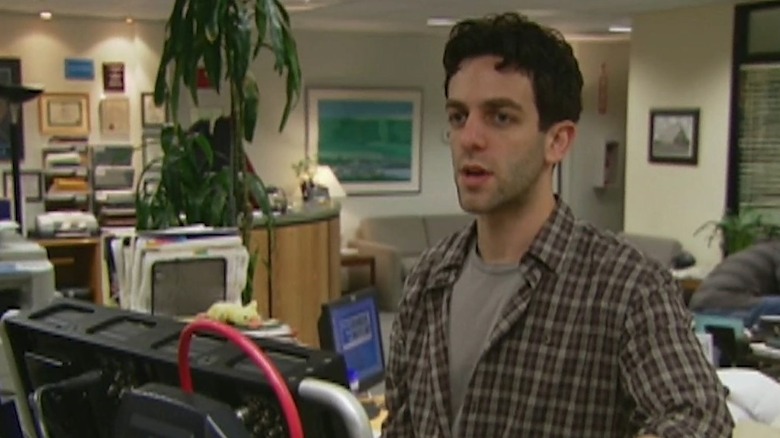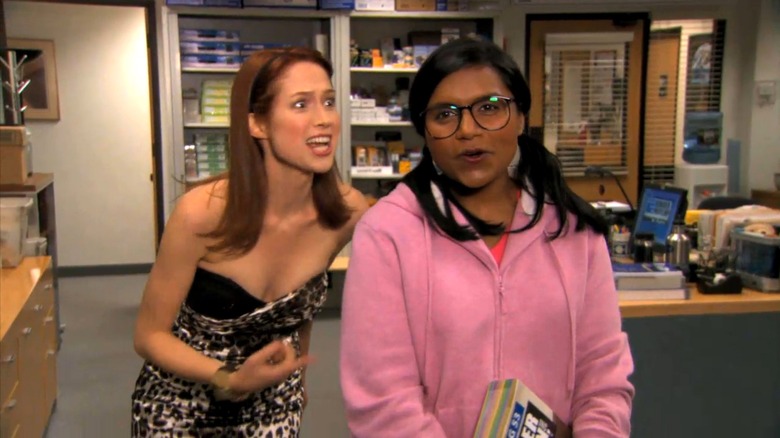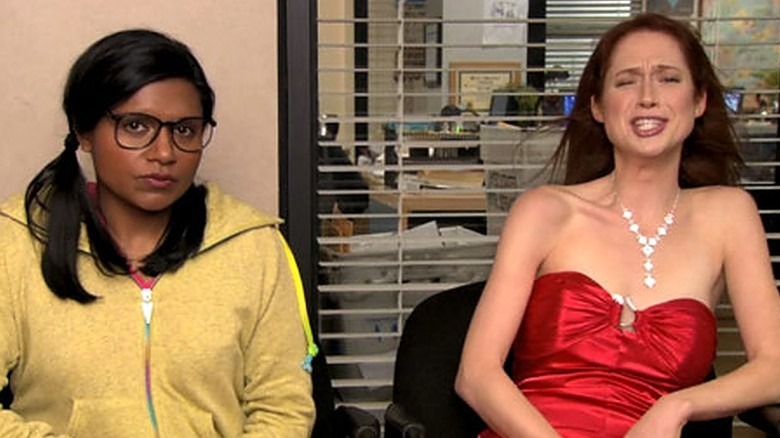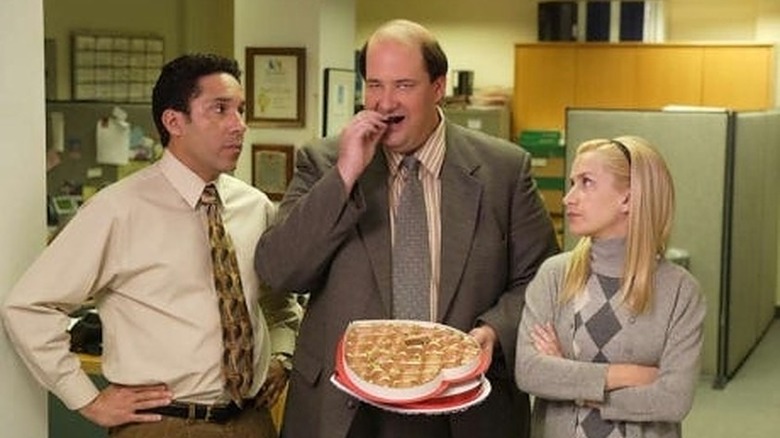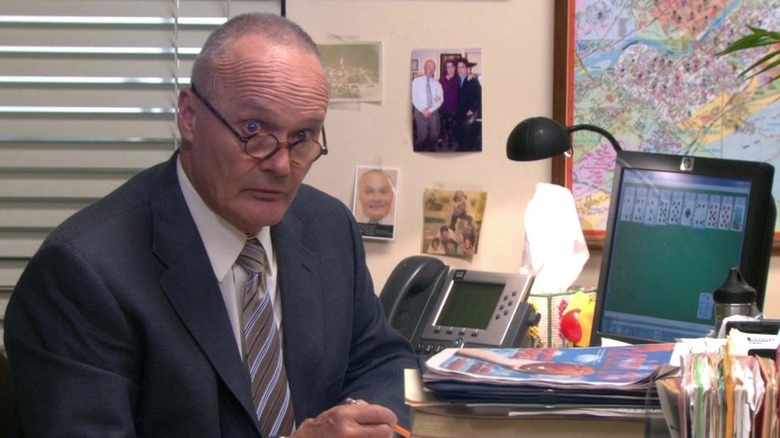The Untold Truth Of The Office Webisodes
If you're a huge fan of "The Office," you probably know about the accompanying Emmy-winning webseries "The Accountants," which came out in the summer of 2006, in that agonizing chasm between seasons. As fans rewatched Season 2 and waited impatiently for Season 3, they were greeted with 10 new, miniature episodes of "The Office" released on NBC.com.
If you're an even bigger fan of the hit sitcom, you probably know that the success of "The Accountants" spawned over a half-dozen other webseries, and while, unfortunately, none of them are quite as long, each one gives us a glimpse into a character or facet of Dunder Mifflin life that we just can't get from the full episodes. We get to see characters who don't get as much screen time in the principal series fleshed out, portrayed with greater creative and improvisational leeway than afforded on network television. If you haven't seen Creed go after his coworkers one by one in the "Blackmail" episodes or witnessed the rise and fall of Malone's Cones in "Kevin's Loan," you're seriously missing out.
And even if you're caught up on all of the bonus web content from "The Office," don't worry, there's still more to scratch the itch the series left us with when it concluded in 2012 — like the behind-the-scenes secrets that made the online hidden gems possible.
Taking background work 'into account'
The webisodes wouldn't have been possible without the background work that the actors behind the three titular accountants — Angela Kinsey, Oscar Nunez, and Brian Baumgartner — had already been doing on their characters. While they spend most of their time in what the character Angela Martin (Kinsey) refers to as an "ill-lit, rarely visited corner of the office," they make that corner come alive. Kevin Malone (Baumgartner) has described them as like a family: "Oscar's the dad, I'm Oscar's dad, and Angela's my mom." Truly a dynasty.
And while the three actors were bumped up from recurring to starring characters beginning in Season 2, they got comparatively less screen time than main characters like Jim, Pam, and Michael. But they made sure that even when they weren't on camera, they were practicing a little improvisation and fleshing out the backstories and personalities of their characters, just in case they were ever called upon to enter the spotlight. Every glimpse we got of their daily life felt like a window into another world.
And indeed, Mike Schur commented in 2006 that if the main show was shot from the back corner where they worked, it probably would have been an entirely different series. Despite less screen time than some of the other characters, the rich backstories and motives that they invented for their characters formed the core of the first webseries, "The Accountants." The webseries wouldn't have been possible without this extra effort.
An award-winning volunteer gig
"The Accountants" also wouldn't have been possible without the volunteer effort of everyone involved. Yep, unlike the broader series, the first set of webisodes weren't a paid opportunity: They were just something fun to do between scenes, and if that doesn't tell you how much the members of the series really loved being a part of it, who knows what will! How good does a job have to be to make someone want to do it for free in their downtime?
For "The Accountants," there was no budget, and the webisodes were written and shot between scenes during Season 2, whenever any of the actors were free. They mainly shot "vignettes" whenever individual characters had time, according to Paul Lieberstein, and then filled in the story whenever they had the opportunity to get more people together at once.
Yet, despite the unconventional nature and composition of the webisodes, "The Accountants" won a Daytime Emmy.
Erin Hannon's horror homage
In the webseries "The 3rd Floor," Ryan decides to direct the next great horror film and uses the office as his shooting location. A common theme, noted by many of those involved, in multiple "Office" webseries is the exploration of a particular character or set of characters and their quest to "put on a show" or secure their own "15 minutes of fame."
This hearkens back to the idea that actors who don't get as much screen time in the main show get the opportunity to shine in these more casual productions. But the "screen time" issue goes beyond the level of NBC's "The Office": The characters are being filmed in the world of the show, too. So "screen time" and the ability to perform for the camera aren't just desires that the actors feel but ones the characters themselves feel as well, as documentary subjects who seem constantly relegated to the background roles.
So it makes sense that when Ryan gets the opportunity to direct a movie, and when Erin (Ellie Kemper) and others get the opportunity to star in it, everyone goes crazy with it. Erin's "hideous" monster is an example of this "extra," over-the-top theatricality — but there was actually some thought put into it by the real "Office" creatives. The look was meant to be a combination of Jeffrey Dahmer on one side and Lizzie Borden on the other.
The new American Idols
The accountants weren't the only ones whose background work on their characters paid off in the webisodes. For the "Subtle Sexuality" series, Mindy Kaling's backstory for her character, Kelly Kapoor, included the dramatically inclined customer service rep getting absolutely sick of watching "American Idol" after years of trying and failing to get on the show and taking matters into her own hands. If America wouldn't idolize her, well, she would idolize herself. It was time to record her own debut song.
That song was called "Male Prima Donna," and, of course, it's about Dwight. Just kidding — the song is very patently a revenge ballad-slash-love song about Ryan the temp (B.J. Novak), who also has a rap interlude in the song.
Everyone involved thought that the song actually turned out really well, and not just in the delusional manner in which Ryan and Kelly in particular believe in their own "it" factor. Ed Helms remarked that you could easily dance to this song (even someone like him, who's not really into clubbing, could get down to it). B.J. Novak went so far as to say that he wouldn't be surprised if you heard it in the clubs. And Ellie Kemper even listened to it while jogging!
Keeping comedy alive
Though they performed admirably in "The 3rd Floor," neither Mindy Kaling nor B.J. Novak like horror in real life. (And the character Ryan has been known to call Kelly in the middle of the night because he thinks there's a murderer in his house, so he may share this aversion to horror with the man who portrays him.) "The 3rd Floor" offered them the opportunity to engage with horror in a more lighthearted, lower-stakes way, almost making fun of the genre that causes them so much distress in its purest form.
The actor behind Gabe Lewis, though — Zach Woods — loves horror and Halloween as much as his character. (We see this on display when he is dating Erin and treats her to such terrifying ordeals as "The Ring," "The Shining," and "Rosemary's Baby" when all she wants to do is watch Pixar.) When he was younger, Woods used to have a whole lip-sync song and dance (that he choreographed himself, complete with accompanying boombox) to "Stayin' Alive" by the Bee Gees, which he would perform with his fellow trick-or-treaters. This is especially fitting considering how iconic that song has become in "Office" canon.
Halloween: gateway to Hollywood
For her Halloweens as a kid, for the first five to seven years of her childhood, Ellie Kemper alternated costumes with her brother each year. One would be Superman/girl and the other a cat each year, and then they would switch the following year. It's a creative way of making use of the available resources, a spirit the "Office" webisodes themselves depend on to function.
When she was a kid, Kate Flannery would dress up as the Flying Nun for Halloween. She's noted that this is something that shows how old she is: The reference is to an American sitcom titled after the character that originally aired on ABC from 1967 to 1970. With her billowy costume on, Flannery actually thought that with a strong wind, she could really fly — and from the top of a hill, she (valiantly, but unsuccessfully) attempted to. It seems that she had a predisposition toward physical comedy and stunt work from a very young age!
Meredith, Flannery's character on "The Office," performed all sorts of stunts and gags herself on the show, many of which unfortunately got cut out of the final episodes, according to the "Office Ladies" podcast. And in the behind-the-scenes interview for "The 3rd Floor," she admits that Halloween is the thing that launched her acting career. Thank goodness for that!
Timing is everything
The idea to shoot a webseries came at probably the worst time for the cast and crew of "The Office." At the beginning of a single-camera comedy season, there's a pretty big buffer between writing, shooting, and editing, but at the end of the second season, when the idea came up, there was hardly any wiggle room and turnaround times were tight.
Mike Schur and Paul Lieberstein came up with the original idea and were also the only writers free to do the webisodes at the time. So they wrote and filmed them whenever there was a spare 15 minutes in the main show's schedule, or even for just a few actors at a time.
Sometimes, Lieberstein would sit down and work on the writing without even getting the chance to de-costume as Toby — he'd just sit there in his mud-colored blazer and churn out Emmy-winning gold. If only the "Flenderson Files" (Toby's true crime podcast) or "A Murder For Framing" (his mystery novel) could have found the same success.
New directions
The "Office" webisodes offered fascinating directorial experiences for a lot of the actors and writers, paving the way for them to take on such roles in the main series. B.J. Novak actually made his "Office" directorial debut during the webseries "Blackmail," not the show itself. He then went on to direct his first main series episode in the very next season, Season 6, helming the inimitable and notoriously cringey "Scott's Tots."
Kate Flannery says Novak is a "natural," not just at directing but at everything in life. This would mean that in real life, B.J. is everything Ryan Howard wishes he could be (or imagines that he is). Or as Kevin Malone would say: He's so money, but he doesn't even know it... But he does.
Novak was a wonderful choice to direct the Creed-focused "Blackmail" episode, because he has a unique sense of the actor Creed Bratton's range: namely that it's infinite. He commented that an episode in which Dwight blackmailed his coworkers would go one way and another way if it were Jim, but with Creed, "it's about a hundred different ways."
Making the cut
Other accounts of B.J. Novak's directing style differed from Kate Flannery's glowing review, though they were affectionate all the same. Creed Bratton said that he "kind of just hisses like a reptile" when he directs, and we're not really sure how to interpret that. Maybe another obscure Creed-ism?
By all other accounts, Novak's directing style was the opposite of this in terms of volume: He started out directing with a megaphone, until his actors reminded him that there were only a few of them there and they were all in close quarters, so a megaphone wasn't really necessary.
In behind-the-scenes footage, Novak can be seen endearingly forgetting the word "Cut!" and shouting different variations on "stop" before remembering that he's the director and gets to utter the famous and coveted Hollywood directive. (He says that he learned to call "Cut!" the hard way, whatever that means.) It's clear that Novak came into his own as a director, though, throughout the course of the webseries, and "Blackmail" is truly a hidden gem.
And the Dundie for prettiest director goes to...
Mindy Kaling made her directorial debut in the webseries "Subtle Sexuality," and like B.J. Novak, she also directed her first regular-season episode in Season 6 of "The Office." Eventually, her creative signature came to be recognizable. As a writer, Kaling typically pens somewhat more dramatic, romantic, and heartwarming episodes and, most notoriously, episodes in which Dwight acts as (or attempts to act as) a real ladies' man.
Some of these episodes, like "Niagara," in which Dwight acts like a real player at Pam's wedding, have come to rest among the most cherished in "Office" canon, and when Kaling directed "Office" episodes, they similarly pulled at our heartstrings. (Think of "Michael's Last Dundies," for goodness' sake.) So we should be eternally grateful to the webisodes for giving Mindy her directing start.
Kaling, while directing the "Subtle Sexuality" episodes, got complete reign over B.J. Novak's hair, wardrobe, and makeup, which we must imagine is a dream come true both for her and her character, Kelly, a nightmare for Ryan, and maybe a little of both for B.J. (She called his look "Adam Levine meets Boys II Men.")
Her cast members have described her during the webisodes as the "prettiest" and "highest-voiced" director and one who knows exactly what she wants and has a unique vision that tends toward sparkly, exciting things — making a pop music video the perfect outlet for her, and her character, to, as Ed Helms puts it, "erupt."
Vacation days
Ellie Kemper said that filming "The Girl Next Door," the final webseries, felt like a "snow day" because only a few people were there. The set felt empty and much less busy, and everyone was more relaxed. These episodes in particular had a carefree air to them, where the actors were just allowed to be goofy and over-the-top in expressing each character's personal brand of vanity while dressed like the "home movie" version of a '90s or early 2000s music video.
Mindy Kaling also noted about the "music video" episodes, and the webisodes in general, that the online format allowed for a lot more "campiness" that veered away from the calculated mundaneness of the regular "Office" episodes. In this less formal setting, the characters (and the actors) actually got to be "unprofessional," as she put it. (Not that the employees of Dunder Mifflin have a particular commitment to professionalism to begin with.)
Off the cuff
Yes, the accountants did do some improvising in their eponymous Emmy-winning online episodes! While "The Office" is famous for both allowing a lot of improvisation and scripting a lot of moments that seem improvised, there was actually a lot more freedom to truly play off the cuff in the webisodes.
The characters got to explore what would normally be left on the cutting room floor in the main series. To give you an idea of just how much we're missing, the editors' cut for each regular series episode would clock in at about 36 minutes, of which about 16 minutes would have to be cut out, which meant that we lost a lot of meat from the more minor characters.
But the webisodes are more than just glorified deleted scenes. Very quickly, they took on a life of their own. The three accountants, Michael Schur noted in 2006, are all "hilarious ... individually accomplished improvisational comedians," so it was really enjoyable to give them the opportunity to "goof around on camera." They'd do the script as written for three or four takes to make sure they had it and then begin to keep going at the end of the take, with the encouragement of the directors, to see if something funny came up. A lot of these things make it into episodes, especially when there is more freedom.
Creed Bratton: Comedy commodity
"Blackmail" is a treat for "Office" fans because while Creed has some of the most memorable lines and non sequiturs from the series, it seems like we never quite get enough of him. He's definitely not one of the characters with the most screen time in "The Office," but even if he was, we'd probably still want more. "Blackmail" gives us a little more.
In this webseries, Creed goes on a series of quests to blackmail various coworkers, and it's as hilarious as it sounds. He realizes that if he can somehow discover or pry out of his colleagues their deepest, darkest secrets, he can pretty much get whatever he wants out of them. His "list of demands" to Kelly includes a helicopter or, if she can't afford that, commodities: Gold, oil, political capital, four-leaf clovers, bones, information, and uranium.
Behind the scenes, his co-stars commented that you can pretty much count on him to be "just Creed" at all times — anytime you turn the camera on him, you'll get something great. Angela Kinsey described seeing him out of the corner of her eye while she was delivering dialogue, and he was just sitting at his desk, not even on camera, making strange gulping fish faces. We can only wonder how many amazing Creed moments were never caught on tape. B.J. Novak describes Bratton as "more than comedy," transcending genre in the "Blackmail" webseries in particular: horror, comedy, melodrama, and even conceivably adult film all in one.
